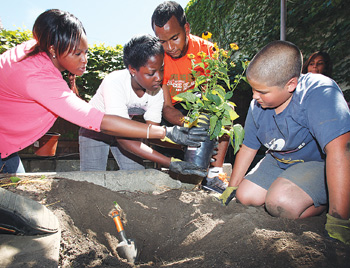Middle school is a notoriously difficult time for adolescents facing personal changes and social pressures.

Photo by Bruce Gilbert
Add to these struggles severe academic problems, and some students may spend years in middle school before advancing to high school. Some may never advance at all.
That’s where Liberty Partnerships Programs (LPP) comes into play. For more than two decades, the statewide, grant-funded program has helped at-risk students stay in school and make it to the next grade. And since 1989, Fordham’s Graduate School of Social Service (GSS) has been integral to helping Bronx students who are part of LPP.
“We link Fordham resources to schools with a high level of students who are at risk of not graduating from eighth grade and going on to high school, of not moving up to the next grade,” said Shelley Topping, director of Fordham’s LPP.
“We provide counseling, tutoring, and mentoring inside of the school building. We also offer high school readiness workshops, some college readiness workshops, and when we can, we provide opportunities for them to come on campus and get a sense of an actual university in the neighborhood—one that is alive and thriving.”
Just a few blocks from Fordham, at M.S. 254, a school with a large immigrant population situated in a low-income and working-class neighborhood, some 100 out of nearly 500 middle-schoolers have been labeled “at risk” by teachers, guidance counselors, and others with direct contact—even parents. These “at-risk” students are chronically truant, have failed more than one subject per year, and/or have social, emotional, or behavioral problems.
“Some of our students come into the sixth grade below where they’re supposed to be in English language arts, math, and science comprehension,” Topping said. “When you come in at a deficit and are expected to catch up to grade level, and when the standardized tests are administered in the second half of the year, it’s going to be a struggle.”
Their academic struggles are often compounded by problems at home, Topping added. Some students lack consistent support after school because their parents work multiple jobs to support the family. Other students are recent immigrants struggling to learn English. Still others are homeless.
“They have a lot of challenges to contend with,” Topping said.
LPP tackles each of these challenges with a Fordham team that provides students with academic and emotional support. Throughout the school year, two GSS interns spend 21 hours per week in the school managing both the students’ cases and the program’s implementation overall.
“We study client-centered management,” said LPP intern Alberta Conteh, GSS ’12. “We know how to work as administrators, but we also learn how to manage social programs through the eyes of what our clients’ needs are.”
The interns meet with each student to provide counseling on an array of issues, including anger management and behavioral problems, and they maintain a channel of dialogue with the students’ parents and teachers. At the same time, the interns train Fordham undergraduates who volunteer to tutor the students in academics.
Interns also coordinate an online mentoring program, ICouldBe.org, which pairs students with online mentors.
The multifaceted approach, Conteh said, helps to put students back on track.
“I had a student who was feeling very dejected about school; she didn’t want to come, she wasn’t completing her homework assignments, and she had also fallen into a clique,” Conteh said. “After we started working together, she began to realize she was an individual, and that she was important. She started thinking about going to medical school, and we were eventually able to get her into a high school with good science classes.”
Given the chance to reflect on what they want from their lives, many students reveal dreams and goals that were previously overshadowed by challenges at school and at home, said former LPP intern Diane Ode, GSS ‘11.
“A lot of middle-schoolers are already thinking about college,” Ode said. “And because Fordham is so close to the school and Fordham is so involved with them, they’re inquisitive. They ask how is the campus, how much is it to go to school—questions you wouldn’t expect. They’re interested in learning about it.”
And the LPP team takes these aspirations seriously. Earlier this month, LPP added to their roster two more schools—M.S. 45 and KAPPA International High School—both of which are close to Fordham’s Rose Hill campus.
“It is my intention to open up talks with admissions and financial aid officers to see if there can be an opportunity for students who have gone through LPP to be considered in a more thoughtful way for admission,” Topping said.
“It’s really easy for them to think about their lives as a sixth-, seventh- or eighth-grader without seeing how that connects to being a high schooler, and then a college student,” she said. “But we do see a change in the students’ behavior, and in their understanding of what life could offer after middle school.”
